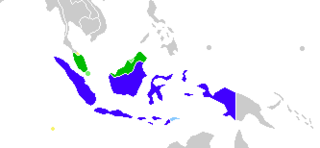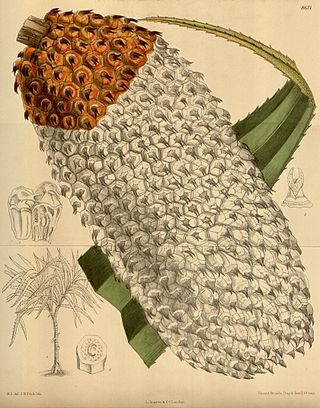Related Research Articles

Malay is an Austronesian language that is an official language of Brunei, Indonesia, Malaysia, and Singapore. It is also spoken in East Timor and parts of Thailand. Altogether, it is spoken by 290 million people across Maritime Southeast Asia.

In Indonesian folklore, the Orang Pendek is the most common name given to a creature said to inhabit remote, mountainous forests on the island of Sumatra. The creature has allegedly been seen and documented for at least 100 years by forest tribes, local villagers, Dutch colonists, and Western scientists and travelers. Consensus among witnesses is that the animal is a ground-dwelling, bipedal primate covered in short fur, standing between 80 and 150 cm tall.

Minangkabau is an Austronesian language spoken by the Minangkabau of West Sumatra, the western part of Riau, South Aceh Regency, the northern part of Bengkulu and Jambi, also in several cities throughout Indonesia by migrated Minangkabau. The language is also a lingua franca along the western coastal region of the province of North Sumatra, and is even used in parts of Aceh, where the language is called Aneuk Jamee.

South Sumatra is a province of Indonesia, located in the southeast of the island of Sumatra. The capital and largest city of the province is the city of Palembang. The province borders the provinces of Jambi to the north, Bengkulu to the west and Lampung to the south, as well a maritime border with the Bangka Belitung Islands to the east. It is the largest province in the island of Sumatra, and it is slightly smaller than Portugal, the department of Boquerón in Paraguay or the U.S. state of Maine. The Bangka Strait in the east separates South Sumatra and the island of Bangka, which is part of the Bangka Belitung Islands province. The province has an area of 91,592.43 km2 (35,364 sq mi) and had a population of 8,467,432 at the 2020 census; the official estimate as at mid-2023 was 8,743,522. The province is rich in natural resources, such as petroleum, natural gas and coal. The province is inhabited by many different Malay sub ethnic groups, with Palembangese being largest ethnic group. Most speak the Palembang language, which is mutually intelligible to both Indonesian and local Palembang Malay. Other ethnic groups include the Javanese, Sundanese, Minangkabau and Chinese. Most are concentrated in urban areas and are largely immigrants from other parts of Indonesia.

The Orang Laut are several seafaring ethnic groups and tribes living around Singapore, Peninsular Malaysia and the Indonesian Riau Islands. The Orang Laut are commonly identified as the Orang Seletar from the Straits of Johor, but the term may also refer to any Malayic-speaking people living on coastal islands, including those of the Mergui Archipelago in Myanmar and Thailand, commonly known as Moken.

The Orang Batin Sembilan, Orang Rimba or Anak Dalam are mobile, animist peoples who live throughout the lowland forests of southeast Sumatra. Kubu is a Malay exonym ascribed to them. In the Malay language, the word Kubu can mean defensive fortification, entrenchment, or a place of refuge. It is metaphor for how the majority and dominant Islamic Melayu villagers believe them to use the interior forests as a means for resisting inclusion in the larger Malay social and Islamic religious world. As is the case with other forest peoples in the region, the term Kubu is associated with very negative connotations.
Keris Mas, born Kamaluddin Muhamad, was a prominent Malaysian literary figure and was one of the founders of the Asas '50 literary movement. His numerous contributions to Malay language literature led him to become Malaysia's first National Laureate in 1981.

Jambi Malay, is a Malayic language primarily spoken by the Jambi Malay people in Jambi, Indonesia, but also spoken by migrants who have settled in Jambi. Jambi Malay is considered as a dialect of the Malay language that is mainly spoken in Jambi, but it is also used in the southern part of Riau and the northern part of South Sumatra. In Jambi, Jambi Malay has eight dialects, including the Tanjung Jabung dialect, Jambi City dialect, Muaro Jambi dialect, Batanghari dialect, Tebo dialect, Bungo dialect, Sarolangun dialect, and Merangin dialect. Jambi Malay is used as a lingua franca and for interaction among the various ethnic groups in Jambi. The differences between each dialect in Jambi Malay range from about 51 to 80 percent.

The Malayic languages are a branch of the Malayo-Polynesian subgroup of the Austronesian language family. The two most prominent members of this branch are Indonesian and Malay. Indonesian is the official language of Indonesia and has evolved as a standardized form of Malay with distinct influences from local languages and historical factors. Malay, in its various forms, is recognized as a national language in Brunei, Malaysia, and Singapore. The Malayic branch also includes local languages spoken by ethnic Malays, further several languages spoken by various other ethnic groups of Sumatra, Indonesia and Borneo even as far as Urak Lawoi in the southwestern coast of Thailand.
Bukit, the Indonesian or Malay word for hill, may refer to:

Butet Manurung or Saur Marlina Manurung is a pioneer for alternative education for indigenous people in isolated and remote areas in Indonesia. Like other young Batak girls, she was called "Butet". Therefore, she is well known as Butet Manurung.

Malay Indonesians are ethnic Malays living throughout Indonesia. They are one of the indigenous peoples of the country. Indonesian, the national language of Indonesia, is a standardized form of Riau Malay. There were numerous kingdoms associated with the Indonesian Malays along with other ethnicities in what is now Indonesia, mainly on the islands of Borneo and Sumatra. These included Srivijaya, the Melayu Kingdom, Dharmasraya, the Sultanate of Deli, the Sultanate of Siak Sri Indrapura, the Riau-Lingga Sultanate, the Sultanate of Bulungan, Pontianak Sultanate, and the Sultanate of Sambas. The 2010 census states that there are 8 million Malays in Indonesia; this number comes from the classification of Malays in East Sumatra and the coast of Kalimantan which is recognized by the Indonesian government. This classification is different from the Malaysia and Singapore census which includes all ethnic Muslims from the Indonesian archipelago as Malays.
The Duano' people, also called Desin Dolak or Desin Duano' are an indigenous people of Malaysia and Indonesia and can be found in islands along the northeastern region of Sumatra, Indonesia where most Duano' people have traditionally lived. They are one of the Proto-Malay group of cultures. Due to their nomadic boat lifestyle, based almost exclusively on fishing and collecting shellfish and crustaceans by using mud-boards, Duano' people are often categorized as Orang Laut, a group that includes the Urak Lawoi’ people and Moken people of the northern region of the Malacca Strait and the Andaman Sea. Although there are similarities in their way of life, they are a separate ethnic group. Citing their own language, culture, identity, and economic complexities, they deny being Orang Laut.

Bukit Tigapuluh National Park - The Thirty Hills - is a 143,223-hectare National Park in eastern Sumatra, consisting primarily of tropical lowland forest, largely in Riau province, with a smaller part of 33,000 ha in Jambi province. It is famous as one of the last refuges of endangered species such as the Sumatran orangutan, Sumatran tiger, Sumatran elephant, and Asian tapir, as well as many endangered bird species. It forms part of the Tesso Nilo Complex biodiversity hotspot. The Park is inhabited by the indigenous peoples of the Orang Rimba and Talang Mamak tribes.

Bukit Duabelas is a relatively small national park covering 605 km² in Sumatra, Indonesia. It is representative of lowland tropical rainforests in the province of Jambi. Only the northern part of the park consists of primary rainforest, while the rest is secondary forest, as a result of previous logging. The park is inhabited by the indigenous Orang Rimba.

The Frankfurt Zoological Society (FZS) is an international conservation organization founded in 1858 with headquarters in Frankfurt am Main, Germany. FZS focuses on maintaining biodiversity and conserving wildlife and ecosystems in protected areas and outstanding wild places. FZS leads and supports about 30 projects in 18 countries. Bernhard Grzimek, renowned German zoo director, zoologist, book author, editor, and animal conservationist in postwar West-Germany, served as president of the Frankfurt Zoological Society for over forty years.

Pandanus furcatus Roxb., also known as korr, pandan or Himalayan/Nepal screw pine, is native to the Sikkim Himalaya of Northeast India, Bhutan and Nepal, Malaysia, Indonesia and West Africa, and occurs on moist and shady slopes of ravines between 300 and 1500 m. As might be expected it is cold-resistant and able to tolerate occasional light frost, slowly growing to a tall branched tree - about 17 m at maturity - and perched on stilt-like aerial roots. The crown is made up of 5 m long, pale-green leaves, with finely toothed margins, while its fruits are sweet-tasting and edible. The leathery flower spathes are golden-yellow, the lowermost are largest and about 1m in length. These give rise to cone-like fruits, 15–25 cm long, that are bright orange to red when mature and consist of 5-6 angled drupes.
Pasir putih is a busy sub-district in the center of Jambi City, Sumatra, Indonesia.
Kerinci people are an Austronesian ethnic group native to Jambi province specifically in the regencies of Kerinci, Merangin, Bungo and the city of Sungai Penuh. Besides Jambi, Kerinci communities can also be found in neighbouring West Sumatra. In the 19th century, some Kerincis migrated to the Malay Peninsula and today its descendants can be found in several states on the west coast of Peninsular Malaysia. The traditional area of the Kerincis covers an area of around 4,200 km² and with a population of 300,000 people. Topographically Kerinci Regency owns hilly terrain in a row of the Bukit Barisan Range with the highest peak of Mount Kerinci.
Rimba may refer to:
References
- ↑ Kubu at Ethnologue (18th ed., 2015) (subscription required)
- ↑ Sager, Steven (2008). The Sky is our Roof, the Earth our Floor: Orang Rimba Customs and Religion in the Bukit Duabelas Region of Jambi, Sumatra
- ↑ Dunggio (1995). Struktur Bahasa Kubu